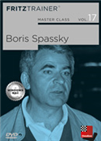A chess extravaganza in Budapest
The first (unofficial) edition of the Chess Olympiad was held in 1924, i.e. a hundred years ago, in Paris. Two years later, the second - still unofficial - edition took place in Budapest. The local team grabbed first place, followed by the Kingdom of Serbs, Croats and Slovenes in second place, and Romania in third place.
A more elaborate organisation was seen in 1927, when the first official edition of the Olympiad, featuring 16 teams, took place in London. Tournaments in The Hague (1928) and Hamburg (1930) followed. The Hungarian team took home gold medals from England and the Netherlands, and grabbed silver in Germany. Almost a century later, Hungary will host the 45th edition of the now traditional - and much anticipated - event.
 In this video course, experts including Dorian Rogozenco, Mihail Marin, Karsten Müller and Oliver Reeh, examine the games of Boris Spassky. Let them show you which openings Spassky chose to play, where his strength in middlegames were and much more.
In this video course, experts including Dorian Rogozenco, Mihail Marin, Karsten Müller and Oliver Reeh, examine the games of Boris Spassky. Let them show you which openings Spassky chose to play, where his strength in middlegames were and much more.While the first 3 official editions featured 16, 17 and 18 teams respectively, this year's tournaments - divided into an open section and a women's section - will break the record of participation. A total of 193 teams registered to participate in the open, while 181 teams will take part in the women's event!
Owing to its rich chess tradition, Hungary decided to put together a squad with real chances of fighting for the top places in the open section. In the previous edition, Hungary entered the event as the 19th seeds and finished in 8th place, with strong performances by Ferenc Berkes and Tamas Banusz, the two highest-rated players in the team. This time around, they will have Richard Rapport - who was born in Hungary but represented Romania from 2022 to 2024 - and the living legend Peter Leko on the top boards, which means they will enter the tournament as the 9th seeds, i.e. gaining 10 spots in the starting rank.

The Hungarian team was presented at the Hungarian University of Sports and Science - from left to right: Richard Rapport, Peter Leko, Sanan Sjugirov, Benjamin Gledura and Ferenc Berkes | Photo: FIDE
Reaching the podium will be extremely difficult, though, as the top 3 squads all have rating averages surpassing the 2700-mark and feature a remarkable mix of youth and experience. The top teams are the United States (rating avg. 2757), India (2753) and China (2724).
In the women's section, the Hungarian squad will start the event as the 14th seeds, two places lower than in 2022, and will feature 4 of the 5 players who made it to the team in Chennai. The top seeds in the women's section are India (24267), Georgia (2462) and Poland (2422).
For anyone following women's chess, it is surely surprising not to see China as the top seed. The Chinese Federation has sent a youthful squad to Budapest, excluding their top 4 representatives: Hou Yifan, Ju Wenjun, Tan Zhongyi and Lei Tingjie, who incidentally are also the 4 highest-rated women players in the world! Still, China's "B team" will kick off the tournament as the 4th seeds and are likely to fight for gold in the massive team event.
 In this video course, experts (Pelletier, Marin, Müller and Reeh) examine the games of Judit Polgar. Let them show you which openings Polgar chose to play, where her strength in middlegames were, or how she outplayed her opponents in the endgame.
In this video course, experts (Pelletier, Marin, Müller and Reeh) examine the games of Judit Polgar. Let them show you which openings Polgar chose to play, where her strength in middlegames were, or how she outplayed her opponents in the endgame.
Schedule
| Round |
Date |
Budapest (CEST) |
New York |
New Delhi |
| 1 |
11 September |
15:00 |
09:00 |
18:30 |
| 2 |
12 September |
15:00 |
09:00 |
18:30 |
| 3 |
13 September |
15:00 |
09:00 |
18:30 |
| 4 |
14 September |
15:00 |
09:00 |
18:30 |
| 5 |
15 September |
15:00 |
09:00 |
18:30 |
| 6 |
16 September |
15:00 |
09:00 |
18:30 |
| Rest day |
17 September |
- |
- |
- |
| 7 |
18 September |
15:00 |
09:00 |
18:30 |
| 8 |
19 September |
15:00 |
09:00 |
18:30 |
| 9 |
20 September |
15:00 |
09:00 |
18:30 |
| 10 |
21 September |
15:00 |
09:00 |
18:30 |
| 11 |
22 September * |
11:00 |
05:00 |
14:30 |
* Note that the final round will kick off 4 hours earlier than usual
Regulations
Read the full regulations (in PDF)
Format
In both sections: Swiss system, 11 rounds.
In both sections, the teams are made up of four (4) players plus one (1) reserve.
Each team has a captain, who may also be one of the players (or the reserve). During play, the captain must refrain from interfering in any way. The captain is entitled to convey demands made by his players. The captain is permitted to appoint a deputy to exercise his functions, the Chief Arbiter should be informed in writing of such a substitution.
Time control, default time and draw agreements
The time control is 90 minutes for the first 40 moves, followed by 30 minutes for the rest of the game, with an increment of 30 seconds per move starting from move 1.
Default time is 15 minutes. Any player who arrives at the chessboard after the default time loses the respective game.
The players cannot draw a game by mutual agreement before Black's 30th move. A claim for a draw before Black's 30th move is permitted only in case of a threefold repetition.
Scoring system and tiebreak rules
In each section, matches are scored by match points. A win scores 2 points. A draw scores 1 point. A loss scores 0 points. A team with the most number of match points in the final standings is declared Olympiad Champion.
The position of teams that finish with the same number of match points shall be determined by application of the following tie-breaking procedure in order of priority:
- TB1 – sum of IS (10) (increased scores) scored against each of the 10 best team opponents (excluding the team opponent which scored the lowest number of matchpoints)
- Each ISi is determined as GPi x FMPi, where:
- GPi is the number of game-points scored in a match against opponent "i",
- FMPi is the final number of match-points scored by opponent "i".
- TB2 – number of game points scored
- TB3 – sum of the match points of 10 teams opponents, excluding the team opponent with the lowest number of match points.
Links
























